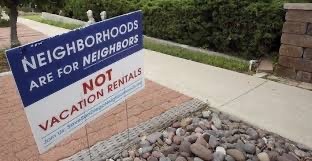Aruba’s Housing Crisis: Why Foreign Investors and Vacation Rentals are Driving Prices Up for Locals
Aruba’s Housing Crisis: Why Foreign Investors and Vacation Rentals are Driving Prices Up for Locals
We all know that Aruba is a beautiful island nation with a thriving tourism industry that has been growing for years. Our island’s natural beauty and warm climate attract thousands of tourists yearly. Our tourism pioneers build hotels and later timeshares to accommodate our guests during their vacations. Somewhere along the road, foreign real estate developers started to build condominiums aimed at tourists wanting a second home. Other foreigners start acquiring houses which they primarily use to exploit as vacation rentals. All of this triggered an increase in the housing demand and an increase in construction prices. In this week’s LEGAL column, I will share some thoughts on the negative effect of the condominium and Airbnb boom on the locals.
Real estate market boom
The real estate market in Aruba has been experiencing a boom, with many new condominiums being built to accommodate the growing demand. The demand for alternate accommodations for tourists has also led many foreigners to buy property in Aruba to be exploited as vacation rentals, a.k.a. “Airbnb”. Both of these trends drive up the cost of housing. The condominium developers didn’t break ground to build homes for locals. They aimed to cater to other foreign buyers, many of whom, in turn, were buying to exploit their condos as vacation rentals for most of the year.
Positive?
While this may seem like a positive development for the island’s economy, it is important to consider the long-term implications of this trend. The rising cost of real estate has made it difficult for young local professionals and those working in the tourism industry to afford a house. The rise of vacation rentals has significantly impacted the availability of affordable housing in Aruba. Many property owners choose to rent out their properties for vacation rentals rather than long-term, creating a shortage of rental properties on the island. This, in turn, has led to an increase in renting costs, making it difficult for many residents to find affordable housing.
Where did the money go?
The rise of vacation rentals has not necessarily helped the island’s economy. Most of the profits generated by vacation rentals are sent overseas or don’t even hit the island, as many of these properties are owned by foreign investors. Some have multiple properties and brag about not paying any taxes on their vacation rental income. They get paid abroad and do not report their income in Aruba. Yet, they gladly use and benefit from the existing infrastructure. This means that the money generated by the tourism industry with vacation rentals is not reinvested into the local economy, which can have long-term implications for the island’s economic development.
A few locals
Of course, some, albeit very few, make a living or supplement their income with vacation rentals. This allows them to benefit a bit from the demand for vacation rentals. Then again, they are also the ones that have lived their lives here and have paid their dues and their fair share of taxes.
Data, data, data
Real estate developers will be quick to say that they “invest” in Aruba and “for the Arubans.” I get it, it is a nice sound bite, but the reality is that these investments do not benefit the locals. Let’s simply look at the data. One way to measure this is by looking at the Gross Domestic Product per Capita, also called GDP/per capita. What does GDP per capita mean? Simply put, it is the amount of income earned per resident.
The GDP per capita in US dollars for Aruba has fluctuated over the past twenty-plus years. It increased steadily from 1997 to 2008, reaching a peak of $29,771 in 2008. However, it then experienced a sharp decline during the global financial crisis, falling to $26,428 in 2009. It has since recovered somewhat but has remained relatively stable at around $25,000 to $26,000 over the past decade, with a slight dip in 2020. In terms of overall growth, we can calculate the change in GDP per capita between 1997 and 2020. The GDP per capita in 1997 was $22,982; in 2020, it was $22,880. Therefore, over these 23 years, the GDP per capita in Aruba has decreased and has yet to reach the 2008 levels. This illustrates that the investments made in the condominiums and Airbnb (and others) gave the island more earnings, but the average local person didn’t benefit. There has been no trickle-down effect. Where did it go? Ask the developers and the buyers of homes for vacation rentals.
Oh, and don’t let them tell you that our GDP is one of the highest in the region because we need to look at what our GDOP per capita means for us and if we benefit from the “growth” or not.
Blame the zoning laws?
The zoning laws and moratoriums introduced by the government were implemented to ensure the island’s development is sustainable and responsible. These measures aim to protect the environment and ensure that the island’s infrastructure can accommodate the growing population and tourism industry. It is not fair to blame the rising cost of real estate solely on these policies, as they are in place for the greater good of the island. Real estate developers have a vested interest in rising real estate prices. Developers are looking to maximize their profits, and the rising cost of real estate benefits them. It is, therefore, not surprising that some developers would quickly blame government policies for the rising cost of real estate rather than taking responsibility for their role in driving up prices. The rise of vacation rentals, such as Airbnb, has significantly impacted the cost of real estate in Aruba. Many foreign investors are buying properties with the sole intention of using them as vacation rentals, which has driven up the cost of real estate and made it more difficult for locals to afford a home. It is not fair to blame government policies for this trend, as the actions of private investors drive it.
What can we do?
Policymakers and community leaders must consider the long-term implications of this trend and take steps to address its challenges. One potential solution is to regulate vacation rentals.
Some examples could include:
- changing the zoning from residential to commercial for all vacation rentals so that they pay a commercial long lease rate instead of the much lower residential rate;
- increasing the real estate transfer and ground tax significantly for foreigners buying real estate;
- prohibiting foreigners from putting up their homes or condominiums for vacation rental. This shared economy should be for locals only;
- implementing a strategy to ensure that the foreigners pay their income taxes on their vacation rentals in Aruba;
- increasing the cost of utilities and waste disposal for foreign ownership so that they contribute to the existing infrastructure rather than just benefiting from it;
Another solution is to incentivize the development of affordable housing. This could be done through tax breaks or other incentives for developers who build affordable housing instead of vacation rentals, ensuring the island’s housing stock is available to those who need it most. Our locals, our kids. Another option is incentivizing affordable housing development or the re-development of places like Caja G.F. Betico Croes, Wilhelminastraat, and J.G. Eman Straat to create housing options for our younger working population.
Closing remarks
The trend of building condominiums and rising vacation rentals in Aruba have significantly impacted the island’s housing market and economy. Real estate developers have a vested interest in the rise of real estate prices, and it is important to hold them accountable for their role in driving up the cost of housing. The rise of vacation rentals has significantly impacted the cost of real estate, and private investors primarily drive this trend. It is, therefore, essential to take a comprehensive and nuanced approach to understanding the factors contributing to the rising cost of real estate in Aruba. As policymakers and community leaders, it is important to act to address these challenges and ensure that Aruba remains a vibrant and affordable place to live for all Arubans.















